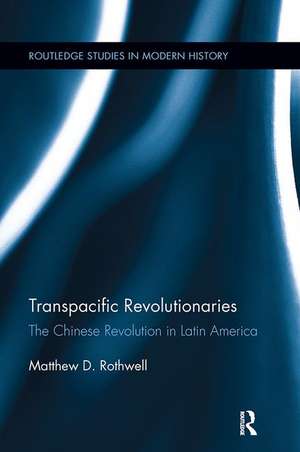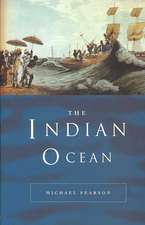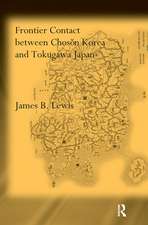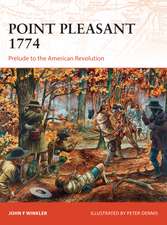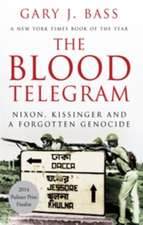Transpacific Revolutionaries: The Chinese Revolution in Latin America: Routledge Studies in Modern History
Autor Matthew Rothwellen Limba Engleză Paperback – 31 mai 2017
| Toate formatele și edițiile | Preț | Express |
|---|---|---|
| Paperback (1) | 416.22 lei 6-8 săpt. | |
| Taylor & Francis – 31 mai 2017 | 416.22 lei 6-8 săpt. | |
| Hardback (1) | 1106.05 lei 6-8 săpt. | |
| Taylor & Francis – 13 dec 2012 | 1106.05 lei 6-8 săpt. |
Din seria Routledge Studies in Modern History
-
 Preț: 300.70 lei
Preț: 300.70 lei -
 Preț: 326.16 lei
Preț: 326.16 lei -
 Preț: 311.48 lei
Preț: 311.48 lei -
 Preț: 312.12 lei
Preț: 312.12 lei -
 Preț: 303.01 lei
Preț: 303.01 lei -
 Preț: 292.90 lei
Preț: 292.90 lei -
 Preț: 312.61 lei
Preț: 312.61 lei -
 Preț: 152.86 lei
Preț: 152.86 lei -
 Preț: 310.95 lei
Preț: 310.95 lei - 9%
 Preț: 935.05 lei
Preț: 935.05 lei -
 Preț: 327.03 lei
Preț: 327.03 lei - 9%
 Preț: 1006.10 lei
Preț: 1006.10 lei -
 Preț: 315.15 lei
Preț: 315.15 lei -
 Preț: 333.88 lei
Preț: 333.88 lei -
 Preț: 310.22 lei
Preț: 310.22 lei -
 Preț: 309.20 lei
Preț: 309.20 lei -
 Preț: 311.41 lei
Preț: 311.41 lei -
 Preț: 326.67 lei
Preț: 326.67 lei -
 Preț: 311.18 lei
Preț: 311.18 lei -
 Preț: 302.88 lei
Preț: 302.88 lei -
 Preț: 311.70 lei
Preț: 311.70 lei -
 Preț: 295.34 lei
Preț: 295.34 lei -
 Preț: 413.13 lei
Preț: 413.13 lei -
 Preț: 437.13 lei
Preț: 437.13 lei - 31%
 Preț: 764.20 lei
Preț: 764.20 lei - 31%
 Preț: 764.62 lei
Preț: 764.62 lei -
 Preț: 495.09 lei
Preț: 495.09 lei - 31%
 Preț: 762.97 lei
Preț: 762.97 lei - 18%
 Preț: 729.55 lei
Preț: 729.55 lei - 30%
 Preț: 823.41 lei
Preț: 823.41 lei -
 Preț: 420.77 lei
Preț: 420.77 lei -
 Preț: 490.40 lei
Preț: 490.40 lei -
 Preț: 416.22 lei
Preț: 416.22 lei - 31%
 Preț: 767.38 lei
Preț: 767.38 lei - 18%
 Preț: 1004.55 lei
Preț: 1004.55 lei - 31%
 Preț: 764.20 lei
Preț: 764.20 lei - 30%
 Preț: 876.36 lei
Preț: 876.36 lei - 18%
 Preț: 1113.91 lei
Preț: 1113.91 lei - 18%
 Preț: 1001.07 lei
Preț: 1001.07 lei - 18%
 Preț: 1000.27 lei
Preț: 1000.27 lei - 30%
 Preț: 820.73 lei
Preț: 820.73 lei - 18%
 Preț: 1000.27 lei
Preț: 1000.27 lei - 18%
 Preț: 1004.55 lei
Preț: 1004.55 lei
Preț: 416.22 lei
Nou
Puncte Express: 624
Preț estimativ în valută:
79.67€ • 86.57$ • 66.97£
79.67€ • 86.57$ • 66.97£
Carte tipărită la comandă
Livrare economică 22 aprilie-06 mai
Preluare comenzi: 021 569.72.76
Specificații
ISBN-13: 9781138108066
ISBN-10: 1138108065
Pagini: 144
Dimensiuni: 152 x 229 x 8 mm
Greutate: 0.45 kg
Ediția:1
Editura: Taylor & Francis
Colecția Routledge
Seria Routledge Studies in Modern History
Locul publicării:Oxford, United Kingdom
ISBN-10: 1138108065
Pagini: 144
Dimensiuni: 152 x 229 x 8 mm
Greutate: 0.45 kg
Ediția:1
Editura: Taylor & Francis
Colecția Routledge
Seria Routledge Studies in Modern History
Locul publicării:Oxford, United Kingdom
Public țintă
Postgraduate and UndergraduateCuprins
Introduction 1. China and Latin America 2. Mexico: The Wayward Disciples of Vicente Lombardo 3. Forging the Fourth Sword of Marxism: The Chinese Revolution and Peru’s Shining Path 4. Bolivia: Nationalists and Maoists Diverge Conclusions
Notă biografică
Matthew Rothwell is Associate Professor of History at Bryant University Zhuhai.
Recenzii
"We have long needed a book such as that which Matthew Rothwell provides in Transpacific Revolutionaries. His work on the important influence of Chinese maoists on Latin American revolutionary thought and action fills a significant gap in our understandings of Latin American marxism." - Marc Becker, A Contracorriente
"This pioneering work measures the effect of Chinese success and experience on key elements of the Latin American left and populism in the second half of the twentieth century including the 1968 student movement in Mexico, the Shining path in Peru, and the growing unrest in Bolivia. It is a must-read for students of Modern Latin America." – John Mason Hart, University of Houston
“The strength of this volume is to be found in its comparative and transnational approach. Students of ‘global’ Maoism and of the transnational influence of the Chinese Revolution, as well as students of the history of the Left in Latin America and of the region’s experience of the Cold War, will find much that is of interest in Transpacific revolutionaries.”Paulo Drinot, Journal of Global History
"This pioneering work measures the effect of Chinese success and experience on key elements of the Latin American left and populism in the second half of the twentieth century including the 1968 student movement in Mexico, the Shining path in Peru, and the growing unrest in Bolivia. It is a must-read for students of Modern Latin America." – John Mason Hart, University of Houston
“The strength of this volume is to be found in its comparative and transnational approach. Students of ‘global’ Maoism and of the transnational influence of the Chinese Revolution, as well as students of the history of the Left in Latin America and of the region’s experience of the Cold War, will find much that is of interest in Transpacific revolutionaries.”Paulo Drinot, Journal of Global History
Descriere
This book shows how Maoism was globalized during the 1949-1976 period, highlighting the agency of both Latin American and Chinese actors. While Maoism has long been known to have been influential in many social movements and guerrilla groups in Latin America, author Matthew Rothwell is the first to establish the way in which Latin American communists domesticated Maoism to Latin American conditions and turned Maoism into an influential political trend in many countries. By utilizing case studies of the formation of Maoist guerrilla groups and political parties in Mexico, Peru and Bolivia, the book shows how the movement of Chinese communist ideas to Latin America was the product of a highly organized effort that involved formal connections between Latin American activists and the People’s Republic of China. It represents a major contribution to three developing fields of historical inquiry: Latin America in the Cold War, the global 1960s, and Chinese Maoist foreign relations.
